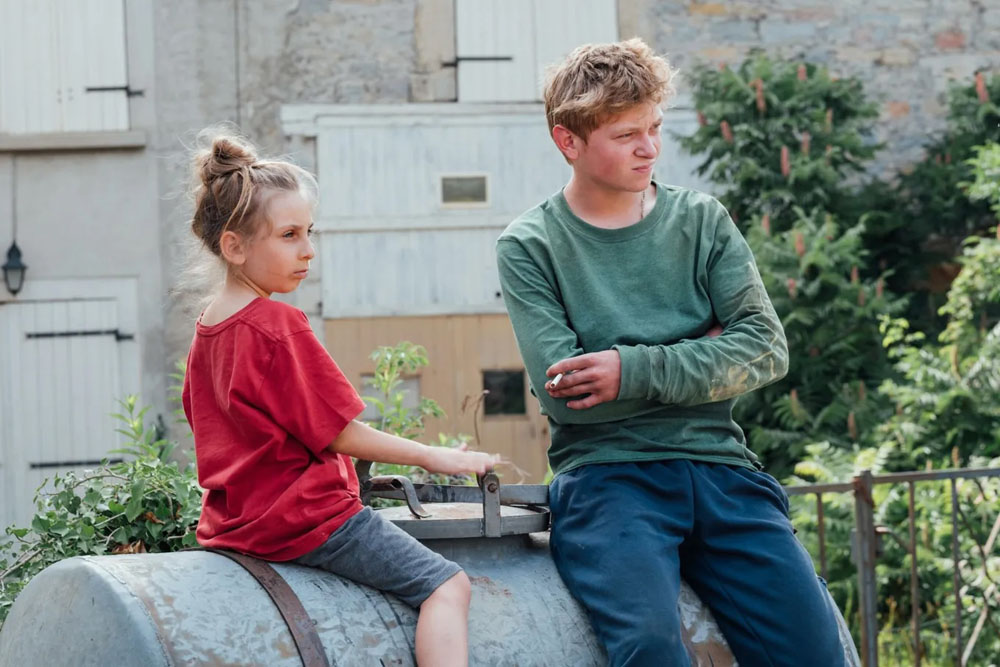A sense of place is everything in Louise Courvoisier’s lovely coming-of-age drama “Holy Cow,” set in Jura region of France where the sun-dappled hills are full of bovine who help in the production of the area’s famed Comté cheese. Everyone that lives there is connected to the industry, either raising the cows for milk or making curds to produce the cheese and businesses are passed down from one generation to the next without dispute when all the children know of work is what their parents do, though when Courvoisier introduces Totone (Clement Faveau), it seems like he could be an exception when he appears to have no ambition at all, gladly peeling off his boxers for a laugh at the local county fair where this is what passes for entertainment.
At 18, Totone doesn’t look to be concerned with much else, nor should he be, filling in for his father when his seven-year-old sister Claire (Luna Garret) needs a watchful eye as he tends to the cheese business, but largely preoccupied with how to waste time with his friends Jean-Yves (Mathis Bernard) and Francis (Dimitri Baudry). However, it all changes in an instant when tragedy strikes and Totone is thrust into overseeing the family’s operations, a task he’s nowhere near prepared to undertake, particularly when debts mount quickly and he’s forced to sell off most of the equipment that could help him make a living. Undecided about whether to follow in his father’s footsteps as a cheesemaker, he has no choice but to embrace his heritage and look to a competition to produce the finest Comté to earn a quick €30,000.
If the premise of “Holy Cow” seems a bit schematic, Courvoisier has something more unruly in mind, honoring a central character who has a difficult time going on the straight and narrow. Although the promise of instant prize money looms over the proceedings, the writer/director knows that the best things from the region require patience and rather than suggest Totone has some preternatural ability that assures him a fortune, he is seen spending far less time perfecting his recipe than working for another farm that produces milk where he can earn €10 an hour just to keep a roof over his head and Claire’s. It’s a way to build character in more ways than one as Totone cleans boilers and does deliveries. He also meets Marie-Lise (Maïwene Barthelemy), who like him has probably more responsibilities than she should at her age in tending to the cows on her family farm and while it seems like it’s only a matter of time that the two will become romantically entwined, Courvoisier sees a playful element to that inevitability when their relationship is driven as much by practicality as genuine affection, given what limited amount of choices they have in their neck of the woods.
Courvoisier seems to be striking the same balance herself in “Holy Cow” when dutifully adhering to some familiar story mechanics to allow for a gentle drama to flourish. A literally plucky score from Linda and Charlie Courvoisier, which marries strings and human humming, give the film a nice momentum to accompany Totone’s baby steps towards maturity and while it can be expected that he’ll stumble along the way towards enlightenment, “Holy Cow” is unusual when triumphs can come simply by accepting that he’ll be better in time. The feeling is a little more instant in the case of Courvosier, who makes a strong impression with this nuanced feature debut.
“Holy Cow” will screen again at the Cannes Film Festival in the Un Certain Regard section on May 18th at 11:30 am at Licorne, 10 pm at the Bazin Theatre, May 19th at 4:45 pm at the Cineum Aurore and May 20th at 4:30 pm at Cineum Screen X.




